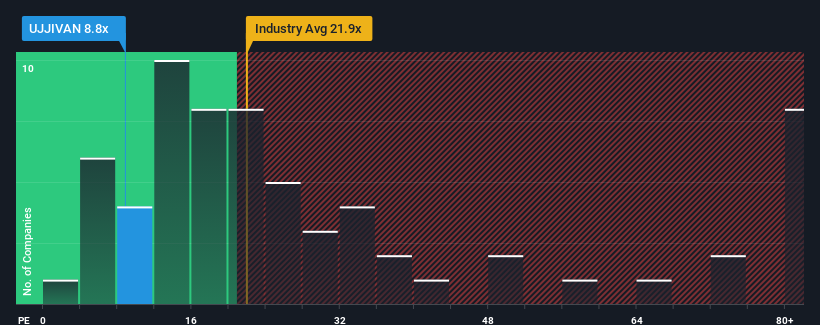- India
- /
- Consumer Finance
- /
- NSEI:UJJIVAN
Ujjivan Financial Services Limited's (NSE:UJJIVAN) Earnings Are Not Doing Enough For Some Investors

Ujjivan Financial Services Limited's (NSE:UJJIVAN) price-to-earnings (or "P/E") ratio of 8.8x might make it look like a strong buy right now compared to the market in India, where around half of the companies have P/E ratios above 32x and even P/E's above 60x are quite common. Nonetheless, we'd need to dig a little deeper to determine if there is a rational basis for the highly reduced P/E.
Ujjivan Financial Services certainly has been doing a good job lately as it's been growing earnings more than most other companies. It might be that many expect the strong earnings performance to degrade substantially, which has repressed the P/E. If not, then existing shareholders have reason to be quite optimistic about the future direction of the share price.
Check out our latest analysis for Ujjivan Financial Services

What Are Growth Metrics Telling Us About The Low P/E?
In order to justify its P/E ratio, Ujjivan Financial Services would need to produce anemic growth that's substantially trailing the market.
Retrospectively, the last year delivered an exceptional 85% gain to the company's bottom line. The strong recent performance means it was also able to grow EPS by 202% in total over the last three years. Therefore, it's fair to say the earnings growth recently has been superb for the company.
Turning to the outlook, the next three years should generate growth of 16% per year as estimated by the one analyst watching the company. Meanwhile, the rest of the market is forecast to expand by 19% per year, which is noticeably more attractive.
With this information, we can see why Ujjivan Financial Services is trading at a P/E lower than the market. Apparently many shareholders weren't comfortable holding on while the company is potentially eyeing a less prosperous future.
The Key Takeaway
Generally, our preference is to limit the use of the price-to-earnings ratio to establishing what the market thinks about the overall health of a company.
We've established that Ujjivan Financial Services maintains its low P/E on the weakness of its forecast growth being lower than the wider market, as expected. At this stage investors feel the potential for an improvement in earnings isn't great enough to justify a higher P/E ratio. It's hard to see the share price rising strongly in the near future under these circumstances.
We don't want to rain on the parade too much, but we did also find 2 warning signs for Ujjivan Financial Services that you need to be mindful of.
If these risks are making you reconsider your opinion on Ujjivan Financial Services, explore our interactive list of high quality stocks to get an idea of what else is out there.
If you're looking to trade Ujjivan Financial Services, open an account with the lowest-cost platform trusted by professionals, Interactive Brokers.
With clients in over 200 countries and territories, and access to 160 markets, IBKR lets you trade stocks, options, futures, forex, bonds and funds from a single integrated account.
Enjoy no hidden fees, no account minimums, and FX conversion rates as low as 0.03%, far better than what most brokers offer.
Sponsored ContentNew: AI Stock Screener & Alerts
Our new AI Stock Screener scans the market every day to uncover opportunities.
• Dividend Powerhouses (3%+ Yield)
• Undervalued Small Caps with Insider Buying
• High growth Tech and AI Companies
Or build your own from over 50 metrics.
Have feedback on this article? Concerned about the content? Get in touch with us directly. Alternatively, email editorial-team (at) simplywallst.com.
This article by Simply Wall St is general in nature. We provide commentary based on historical data and analyst forecasts only using an unbiased methodology and our articles are not intended to be financial advice. It does not constitute a recommendation to buy or sell any stock, and does not take account of your objectives, or your financial situation. We aim to bring you long-term focused analysis driven by fundamental data. Note that our analysis may not factor in the latest price-sensitive company announcements or qualitative material. Simply Wall St has no position in any stocks mentioned.
About NSEI:UJJIVAN
Ujjivan Financial Services
Ujjivan Financial Services Limited provides financial services to economically weaker section in India.
Average dividend payer with moderate growth potential.
Market Insights
Community Narratives




